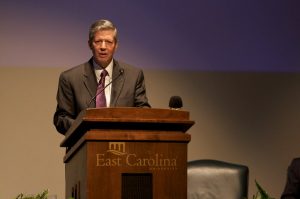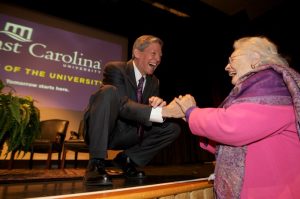Ballard praises strengths, outlines goals in State of the University address

ECU Chancellor Steve Ballard says the university is strong.
Greenville, NC — East Carolina University Chancellor Steve Ballard hailed the institution’s successes Feb. 3 and laid out a vision for the challenges and goals ahead.
In his inaugural State of the University address, Ballard cited ECU’s strong growth in enrollment, its building boom, and its successes in the classroom and on the athletic field.
“We are providing great leadership across the nation, in our state and within our own community,” Ballard said in a speech at Hendrix Theatre on campus.
Ballard outlined ECU’s strengths: enrollment has grown faster than any other public institution in North Carolina; more than 500 faculty members have arrived since 2004, with about 50 more expected this year; an unprecedented building boom has meant nearly $300 million in new facilities, with more on the way; and a new dental school is set to open in 2011.
The fiscal crisis has been tough, Ballard said, but ECU remains in better financial shape than about 75 percent of U.S. public universities and is “among the best universities in aggressive planning for the worst-case conditions.”
The 50 states have a $250 billion-dollar budget deficit, he said. Expenditures per capita on higher education have decreased almost 6 percent. North Carolina’s unemployment rate is 11 percent.
“Any prudent assessment tells us that we should expect at least one more year of tough fiscal times and perhaps longer,” Ballard said.
ECU would emerge from such financial stressors as a better university, he said.
“We will not just survive this time period, but we will be a better university because now we must do it,” Ballard said. “Money and wealth have never defined us, and this short-term crisis will not deter us.”
In his introduction, Board of Trustees chairman David Brody said that the state of the university is “considerably better” than when Ballard arrived at ECU in spring 2004. “Even though we’re in the second year of severe budget constraints, the universities accomplishments have been remarkable.”
Ballard outlined some of those accomplishments:
More than 11,000 students are registered with the Volunteer and Service-Learning Center, and they have provided more than 161,000 hours of community service.
The first graduating doctoral class in the Medical Family Therapy program graduated last year, three years after ECU became the first university to establish a doctoral program in that discipline.
Project STEPP, which stands for “Supporting Transition and Education through Planning and Partnerships,” has retained 97 percent of the learning-disabled students it serves. Its students, who have the capability and passion for a college education, have grade-point averages comparable to their peers, Ballard said.
The College of Education is a national leader in addressing teacher quality and supply. ECU was the only university in North Carolina to receive a Teacher Quality Partnership Grant from the U.S. Department of Education; the grant provides $9 million during the next five years to improve teacher preparation.
Women’s basketball has had the best-ever season start, the football team won a second consecutive Conference USA championship, and the baseball team won an NCAA regional title last spring. Student athletes maintain higher GPAs and graduation rates than their peers, and they rank in the top three among conference universities academically, he said.
ECU’s military programs continue to serve troops. With probable $2.4 million federal funding, ECU’s Operation Re-Entry will expand efforts to help wounded soldiers.
More physicians trained by the Brody School of Medicine stay in North Carolina than do graduates of any other N.C. medical school. Brody is ranked second nationally by the American Academy of Family Physicians for graduates entering family medicine.
The under-construction School of Dentistry will place fourth-year students in underserved areas across the state. “No other dental school has made the commitment that we have to providing oral health care to those areas of the state that don’t have or have very little of it,” he said.
ECU’s College of Allied Health Sciences is the largest provider of such professionals in the state, with 98 percent of graduates achieving national certification or licensure and 85 percent of graduates remaining in state. “It has achieved near-perfection in work force preparation,” Ballard said.
The Ph.D. program in coastal resources management has helped meet the need for trained specialists who move between the worlds of coastal research, science and policy.
Ballard also acknowledged ECU’s challenges. The university must improve retention rates, he said. It must be even more engaged with local leaders to reduce safety risks. And, he said, ECU must strive to provide strong financial aid: for every $500 gap in aid, the chances of losing a student increase by 9 percent. “Perhaps our biggest single challenge to our values of access and our goal of student success is financial aid,” he said.
As ECU moves ahead, Ballard said, it will build on strengths with several opportunities. It will focus on leadership and continue its commitment “to give every undergraduate student a significant leadership opportunity.”
ECU will turn its honors program into a comprehensive, world-class Honors College that attracts the state’s best students, retains them and celebrates their work. “This complements our history of both access and success,” he said. “So let’s never give in to the false dichotomy of ‘access versus quality.’ Both are part of our legacy, and we remain committed to both.”
While not competing or duplicating other established state engineering programs, ECU must train more engineers and add biomedical engineering to the university’s programs. “We have more capacity than any other university in North Carolina to make a contribution in this area,” he said.
ECU must expand on its legacy of research and economic development for eastern North Carolina. “I am especially proud, for example, of the Outreach Scholars Academy, our long-standing expertise in coastal and marine science and our recognized expertise in bio-energetics and health disparities research,” he said.
Finally, he said, ECU must focus more on resources for graduate education.
“ECU is a special place,” Ballard said. “We are special because we have a soul and we are authentic. We do what we say we’re going to do. Our soul is what we mean to our students and the service we provide for others. Nothing is more important to our future than knowing this, cherishing it, and never compromising.”

ECU Chancellor Steve Ballard talks with state Rep. Edith Warren following his State of the University speech.